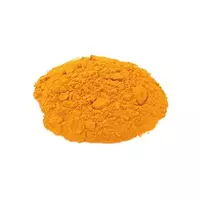Turmeric

Turmeric is a tasty and healthy spice from the dried and powdered root of a plant in the "ginger" family. It is widely used worldwide as a bright yellow and spicy dye with a pleasant but faint smell. Turmeric is considered the birthplace of Southeast India, and Europeans met it back in the Middle Ages. Unfortunately, this spice did not receive such recognition and fame as cloves and cinnamon, but thanks to its properties, turmeric still found connoisseurs among culinary experts around the world.
In the food industry, dyes are made from it, which is then added to butter, margarine, yogurts, salad watering, cheeses, as well as various seasoning mixtures. In English, Indian and many other cuisines, turmeric is used as a full spice. It is added to dishes made of poultry, fish and seafood, as well as sauces, salads, stews and soups. Often it is she who is preferred if you need to give the dish a pleasant yellow hue, so turmeric is an excellent alternative to expensive saffron. The calorie content of turmeric is 354 kcal per 100 grams of spice.
The benefits of turmeric
Turmeric contains a lot of useful substances, due to which it is referred to medicinal species of plants. The presence of anti-cancer and anti-inflammatory properties unequivocally speaks in favor of turmeric. This spice has important B vitamins for humans, as well as calcium, iron, zinc and phosphorus.
This wonderful spice and modern cosmetology have not been bypassed: it is one of the components of scrubs and face masks. Cleansing procedures using such agents have an anti-inflammatory, healing and antibacterial effect.
It has been scientifically proven that turmeric has the ability to reduce the likelihood of developing leukemia in children and slow down the inevitable processes of Alzheimer's disease. Thanks to the ability to regulate the metabolism in the body, this spice is perfectly suitable as an assistant in the fight against excess kilograms.
Folk Indian medicine claims the benefit of turmeric, as a wonderful means that is able to clean energy channels (the so-called "chakras") and gives a person the opportunity to feel united with the Universe. It is also used for urinary tract diseases and to stimulate appetite.
The harms of turmeric
Although turmeric is classified as a relatively harmless product, we still advise you to consult your doctor in advance to avoid undesirable consequences. This is due to the fact that the harm of turmeric can affect those who suffer from diseases of the gallbladder. In addition, doctors recommend refraining from using this spice while using other drugs.
turmeric 354 kCal
Energy value of turmeric (Ratio of proteins, fats, carbohydrates - ju):
Proteins: 7.83 g (~ 31 kCal)
Fats: 9.88 g. (~ 89 kCal)
Carbohydrates: 64.93 g (~ 260 kCal)
Energy ratio (b | y): 9% | 25% | 73%
 Español
Español Français
Français Português
Português Русский
Русский 简体中文
简体中文 繁體中文
繁體中文 日本語
日本語 한국어
한국어 العربية
العربية Türkçe
Türkçe Қазақ
Қазақ Deutsch
Deutsch Italiano
Italiano Українська
Українська
